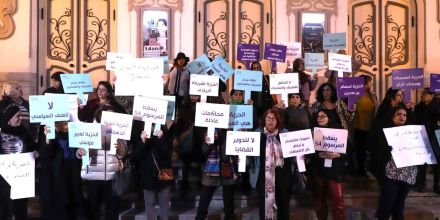Publications and Resources
Toda has published numerous Policy Briefs and Reports, as well as books and journals, over the last twenty years. See below for the publications in each thematic area. Guidelines for authors can be found here.
See the full list of Policy Briefs and Reports or view Policy Briefs and Reports by Research Theme:
An Eye on Moroccan Democratization: Towards an Adaptation?
Report No.278 - February, 2026 • By Aisha Kadaoui
This report evaluates the implications of Morocco’s political trajectory, arguing that it represents a form of adaptive governance rather than substantive democratization. It highlights Morocco’s specific model of managed pluralism, in which periodic multiparty elections function within a system of controlled pluralism. The analysis demonstrates how the democratic process operates within a specific architecture, characterized by the structuring of the margins of political competition and the centrality of the monarchy. The paper further analyzes the reconfiguration of the political landscape, specifically the consolidation of the National Rally of Independents as the country’s ‘quasi-ruling party’. The policy paper concludes with several recommendations.
Policy Challenges to Democratization in the Occupied Palestinian Territory
Report No.277 - February, 2026 • By Hanan Kaoud
This paper contends that the future of Palestinian governance requires more than technocratic fixes. Palestine is increasingly besieged, externally by the genocidal campaign in Gaza and the enduring Israeli colonial control over the Occupied Palestinian Territory (oPt), and internally by authoritarian fragmentation within the Palestinian political system. The current configuration of governance operates through elite consensus, donor patronage, and institutional paralysis. This paper calls for the articulation of a new social contract and concludes with recommendations for the construction of new institutions that embody popular sovereignty under conditions of ongoing colonial fragmentation.
Arab Women’s Inclusiveness: Navigating Terrains of De-Democratization and Conflict
Report No.276 - February, 2026 • By Layla Saleh
This paper surveys the landscape of women’s inclusion in Arab politics since 2011 and to analyze the status of gender relations in Arab authoritarian domestic politics. It identifies three interrelated trends that have variously unfolded across the region: the general retreat in women’s bottom-up mobilization, a separation between women’s political leadership and the democratic question, and the increased insecurity of women in settings besieged by conflict. The paper concludes with some recommendations for local/regional civil society and international allies seeking to enhance Arab women’s substantive political inclusion and participation in zones of de-democratization and violent conflict.
The Arab Spring Rollback and Varieties of Arab ‘Autocratization’
Report No.275 - February, 2026 • By Larbi Sadiki
Toda Peace Institute presents a report series, “An Eye on Arab De-democratization,” that seeks to capture the nature of democratic erosion in a MENA Arab cluster of nine countries plus one case study covering the gender question in relation to ‘democratization’. The Arab region (interchangeably Middle East and North Africa – MENA) has had a chequered history with democratization. Evidently, today, the trend is not one of democratic transition but rather one of ‘autocratization’, i.e. of democratic de-consolidation. The report series will be published over the next three weeks, beginning with this Introduction, the case studyon Arab women, and reports on Palestine and Morocco.
When Growth Becomes a Peace and Security Risk
Policy Brief No.274 - February, 2026 • By Jordan Ryan
This policy brief argues that the persistence of GDP as the organising framework for economic policy is not merely a measurement problem but a governance failure with direct consequences for peace and security. Growth models that reward environmental destruction, deepen inequality within national societies, and misprice systemic risk generate the structural conditions for instability. The Beyond GDP initiative launched under United Nations auspices represents a threshold moment. The brief examines how GDP-centred economic paradigms undermine conflict prevention, resilience, and early warning capacity, and concludes with policy recommendations centred on the development of a single composite wellbeing measure to be reported alongside GDP, together with targeted proposals for multilateral institutions, national governments, and the peacebuilding community.
Books (1996-2017)
Toda Peace Institute's Publications: Complimentary copies of our publications are available where noted.
Journals (1996-2017)
Peace & Policy: Since 1996, Peace & Policy has become a significant journal of opinion on global peace and policy issues.




